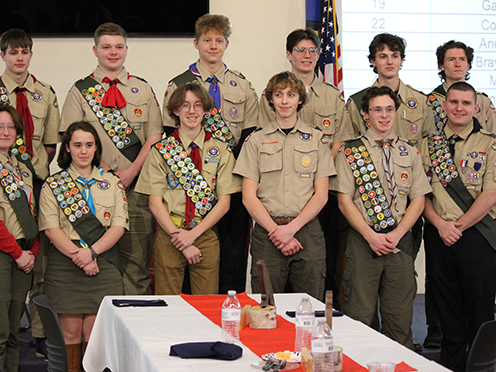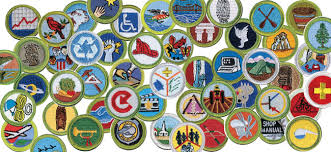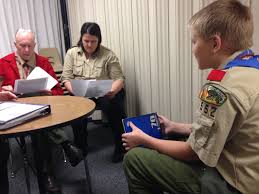Advancement is the process by which Scouts progress from rank to rank and promotes and encourages ongoing member involvement and commitment. The Advancement method provides a series of surmountable obstacles and steps to overcome them. Scouts plan their advancement and progress at their own pace as they meet each challenge. Scouts are recognized and rewarded for each achievement, which helps them gain self-confidence. The steps in the Advancement system help a Scout grow self-reliance and the ability to help others. It works best when it is built into a unit’s program so participation leads to meaningful achievement, recognition, and a continually improving readiness for more complex experiences.
Quick Links
- Tracking Advancement
- Merit Badge Counselors
- Board of Review
- Eagle Scout Projects

- Contacts
- Helpful Links
Tracking Advancement
Tracking a Scouts (Cub, Scouts BSA, Venturing) is done in a variety of ways:
-
- Youth Handbook
- Tracking Chart
- Blue Cards
- Scoutbook
- Troop Master
No matter how your Unit tracks advancement, remember to enter it in Internet Advancement 2.0, to create the National BSA record. By recording advancement in IA you can:
-
- Generate purchase reports
- Ensure all requirements for advancement are met
- Ensure Eagle Application prints properly
- Allow Units to run advancement reports on individual Scouts

The easiest method for entering the information is to use the Scoutbook app provided to all Units and families as a part of your charter & registration fees. Scoutbook also has a parent app found on both Android & IOS.
Merit Badge Counselors
The merit badge counselor is a key player in the Boy Scout advancement program. Whatever your area of expertise or interest—whether it is a special craft or hobby (basketry, leatherwork, coin collecting), a profession (veterinary medicine, aviation, engineering), or perhaps a life skill (cooking, personal management, communications)—as a merit badge counselor, you can play a vital role in stirring a young man’s curiosity about that particular topic. By serving as a merit badge counselor, you offer your time, knowledge, and other resources so that Scouts can explore a topic of interest.

WHO CAN BE A MERIT BADGE COUNSELOR?
To meet the basic requirements to serve as a Merit Badge counselor, you must be:
-
- At least 18 years of age
- Of good moral character
- Have some education, background, expertise, or experience in the subject or subjects you choose to counsel
- Have the ability and desire to work with Scouts from 12 to 17 years of age
As a merit badge counselor, your mission is to join fun with learning. You are both a teacher and mentor to the Scout as they work on a merit badge and learn by doing.
HERE ARE THE SIX STEPS TO BECOMING A MERIT BADGE COUNSELOR:
-
- Decide which badges you are qualified to counsel.
- Read all the requirements for any badge that may interest you, or that you are qualified to teach – through your education, experience, or knowledge. Choose the ones that you would like to counsel from this link: National Merit Badge Listing & Requirements
- Check out what is involved in counseling at this link: Everything about being a Merit Badge Counselor
- The Boy Scouts of America has three expectations from a merit badge counselor:
- Complete the online merit badge counselor training within 1 year. This training is especially helpful if you are new to Scouting.
- Respond to inquiries from Scouts seeking a merit badge counselor if you set up your preference as “Available”. Inquiries are usually emails, so you must check the email address you provided every few days.
- Reply to the annual January email to confirm your merit badge counselor status.
- Complete and sign an Adult Application to register with your district. Please use Position Code #42, Merit Badge Counselor.
- Adult Application, if you prefer an online application please contact your District Advancement Chair
- This application is available from your troop or Council office and needs only your signature on both the application and the Disclosure/Authorization Form.
- Note: there is NO membership fee charged to merit badge counselors.
- Complete the BSA Youth Protection Training from this link: https://www.scouting.org/training/youth-protection/
- The Boy Scouts of America seeks to create a safe environment for young people and adult leaders to enjoy the program and related activities. BSA Youth Protection Training helps preserve that environment.
- After completing the training, print a copy in Adobe.PDF format of your BSA Youth Protection Training completion certificate to create an electronic copy.
- You must have completed Youth Protection training within the past two years at the time of application.
- For creating an account in my.scouting.org and taking YPT training see this link” https://www.youtube.com/watch?v=64ZtPfOC71M
- If you reside in Pennsylvania you will need the Act 15 clearances: Click here for more info
- Complete/sign the BSA Merit Badge Counselor Information Form at this link: Merit Badge Counselor Information
- You may request up to 12 merit badges with no more than 3 Eagle-Required. (The limit ensures Scouts are exposed to a wide circle of adults).
- Please explain your qualifications to counsel the requested badges. Note: you can choose which Scouts you wish to advise on the form but will repeat this through your Scoutbook merit badge counselor account.
- There are specific requirements for counselors who counsel shooting sports (Archery, Rifle Shooting, Shotgun Shooting), waterfront sports (Canoeing, Kayaking, Lifesaving, Rowing, Scuba Diving, Swimming, Whitewater), Climbing, or Snow Sports. Applicants must attach copies of licenses or certifications to support their knowledge/training. Details on specific qualifications/certificates can be found in the 2021 Guide to Advancement, Section 7.0.1.1
- Five Rivers Council requires an eight-hour council diversity training for Citizenship in Society merit badge counselors. Please contact your district advancement chair for the next scheduled training.
- Return all your applicable forms only to your District Advancement Chair:
- Once the advancement chair has received merit badge application paperwork, it will be reviewed to assure it is complete. A common error is the failure to list the applicant’s qualifications to counsel each particular merit badge. This is a critical factor in the application. Please take the time to list your detailed qualifications on this form or an additional sheet, as the form has very limited space. You will be contacted directly should there be any questions or missing data.
- New Merit Badge counselors may not begin working with Scouts until approval is received from the District Advancement representative and also the BSA. You may begin counseling after you have been notified that your application has been processed and accepted by the BSA. You will receive an email that your application is being processed and another when it has been approved.
- As your acceptance, you will receive an email from Scoutbook asking you to create an account. You must use the same name and password with Scoutbook that you used with my.scouting.org to take your YPT training. You will then be asked to fill out your preferences. You should then set up your profile in Scoutbook. Instructions can be found at this link: https://www.youtube.com/watch?v=OUNU_URIT94
- Decide which badges you are qualified to counsel.
MERIT BADGE COUNSELOR TRAINING
This training is required within the first year for all counselors: Directions for taking Merit Badge Counselor Training through My.Scouting.org:
BELOW ARE LINKS TO ADDITIONAL INFORMATION FOR COUNSELORS:
Board of Review
A periodic review of the progress of a Scout is vital for the effectiveness of the Scouting program in the unit. The unit committee can judge how well the Scout being reviewed benefits from the program. The unit leader can measure the effectiveness of his or her leadership. Scouts can sense that they are, or are not, advancing properly and can be encouraged to make the most of their Scouting experience.
Not only is it important to review those Scouts who have learned and been tested for a rank, but also to review those Scouts who have shown no progress in their advancement over the past few months.
Participants in a Board of Review must keep these objectives in mind:
-
- Ensure the Scout has completed the requirements for the rank.
- Evaluate the experience the Scout is having in the unit.
- Encourage the Scout to progress further.
When is a board of review required?
Cub Scouts: Boards of review are not required at any level.
Scouts BSA: Board of review required for every rank from Tenderfoot to Eagle Scout. (See rank requirements here.)
Venturing: Board of review required for Discovery, Pathfinder, and Summit awards. (See a Venturing board of review guide here).
Sea Scouts: Bridge of review is required for all ranks. (Learn more here)
Eagle Scout Information
Eagle Scout is the highest advancement rank in Boy Scouting. In 2012, the centennial year of the Eagle Scout Award, 57,976 Scouts earned the Eagle Scout rank— more than in any previous year. In 2013, 62 Boy Scouts in the Five Rivers Council, BSA earned their Eagle Award! That is roughly 5.7% of registered Boy Scouts. The National average is 6.57%. From 1912 to 2012, more than 2 million Boy Scouts earned the Eagle Scout rank.
If you would like to get started on your Eagle Scout Award, start here:
-
- Five Rivers Council Eagle Process – Revised 3/1/23
- Eagle Project Workbook
- Eagle Scout Rank Application. This can also be generated inside of Scoutbook:
- Log into Scoutbook
- Goto the Scout

- Click on Reports
- Select Eagle Application
You can earn Eagle Scout Palms after you have earned your Eagle Scout Award. Here’s where to get started:
-
- Eagle Scout Palm Requirements – Recently Revised
Additional Eagle Scout resources and information:
If you would like additional information or if you have questions, please contact the Scout Service Center.
Eagle Scout Projects
Eagle Scout Projects are the culminating event for a Scout who is trying to achieve the highest rank in the Scouting program. Donations of time, talent, materials, and resources are always needed. The Eagle Project is generally completed in the area where the scout lives and is active and local resources are always appreciated.
WHAT DEFINES AN EAGLE SCOUT PROJECT
Eagle Scout projects are evaluated primarily on impact—the extent of benefit to the religious institution, school, or community, and on the leadership provided by the candidate. The Scout must provide evidence of planning and development.
The Eagle Project must be helpful to any religious institution, school, or community. Projects may not be commercial or for a business but could benefit museums, various service agencies, homes for the elderly, or a public park. The test is whether the project primarily benefits the community, not business profits.
Routine labor is not normally appropriate for a project. This might be defined as a job or service you may provide as part of your daily life, or a routine maintenance job normally done by the beneficiary. For example, pulling weeds on a school football field is not appropriate.
A project may not be a fundraiser. In other words, it may not be an effort that primarily collects money, even for a worthy charity.
The Five Tests of an Acceptable Eagle Scout Service Project:
-
-
- The project provides sufficient opportunity to meet the Eagle requirements.
- The project appears to be feasible.
- Safety issues will be addressed.
- Action steps for further detailed planning are included.
- The Scout is on the right track with a reasonable chance for a positive experience.
-
Contacts
Council Advancement Committee Chairman – Chris Ziegenfus 607-795-6166
Council Merit Badge Counselor Coordinator – Connie Cummings 814-367-8093
Advancement Staff Advisor – Chris Theurich – 607-368-4138
Bighorn District
-
- Advancement Chair – Vacant (Contact Connie Cummings temporarily)
- Eagle Advancement Chair – Micah Palmer 607-207-4657
Endless Mountains District
-
- Advancement Chair – Connie Cummings 814-367-8093
- Eagle Advancement Co-Chairs – Greg Hughey 607-738-7065 & Mark Allis 607-857-5962
Silver Fawn District
-
- Advancement Chair – Nancy Potter 607-698-4038
- Eagle Advancement Chair – Peter Reif 607-346-1821
Helpful Links
Advancement News Newsletter Archive
Advancement Resources Page – Scouts, BSA & Venturing Advancement Resources
Eagle Scout Service Project Workbook
Cub Scout Advancement Resources
Cub Scout Adventures
